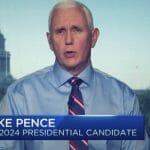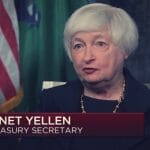In an wide-ranging exclusive interview, CNBC’s Andrew Ross Sorkin talks with Lloyd Blankfein, Goldman Sachs chairman & CEO, about cuts in the Fed’s bond-buying program; the move higher in interest rates; the trade in gold; the best candidate to head the Fed; joining the Dow, and how regulations are impacting the banking industry.
Transcript:
andrew joins us from chicago with our special guest. thank you. we’re live in chicago. goldman sachs just finished up the cfo conference. thank you for being here on what we think will be a big news day. i’ll ask you, what do you think will happen at 2:00, and does it matter? it matters more or less depending on what happens. i think it matters to people. i don’t think it should matter as much as people are weighing in on. it probably will matter. what are you expecting? i expect — i think at this point there has to be some cut. i don’t think if it’s a number like down 10 billion, the market will be happy. the market will be sad because we’re losing the heroin injection or because — that could be good news right? i’ll use metaphor of head wind and tail wind. there’s a tail wind from the fed. people think this is the first moment when there’s a withdrawal from the market. it’s not as big a deal. it’s not the first withdrawal. the biggest artificial support the markets had a long time, we’ve been withdrawing that steadily. the biggest support the markets had was the unbalanced budget we had. spending more than we were taking in revenue. we have tie had the up. the payroll tax coming back. all those things are moving toward normalization as in rise in interest rates. the fact interest rates for 1 1/2% was influential to the market. this is not the first step. also the expectations are embedded. austan goolsbee on a moment ago, he seemed worried if we got to too much it would be bad news. that the economy is still too fragile. where the are we? in substance it’s a recovery where trajectory is not as steep as it should be. all these support measures are a form of insurance not because we think it will turn back but because it might turn back. it’s too high — i’d rather be cautious. the odds of it turning back are not great. are you a believer it worked? i think it was — at the margin, it made a contribution. who knows. you can’t go back and see both paths. i would say — i would have if i were in charge of running the economy, i would have done anything i could. this was in the positive direction. joe has a question back at hq. only in relation to another market. i want goldman’s comments. goeldman said gold would keep going down because of the taper. lloyd, were you part of that — are you there for decisions like that? do you agree? where do you think gold could go? i’m not part of the process of generating that point of view. i always have a point of view on gold where i start at jr commodities. my first job was on the gold market. gold is trading higher to other currencies. they trade against each other at a point people were questioning the behavior of every bank. all of a sudden, gold became the alternative currency or two currencies. by the way, with interest rates rising, gold doesn’t pay. it becomes not only less important to hold gold as an alternative but more expensive but to hold as an insurance policy. do you think it could go to a thousand? in gold, it’s always — gold is not even a fiat currency. gold is what people think it’s worth. it’s not value. it’s a direction from where you are. that’s the hardest place to figure out where it belongs. that’s down. i would think that would trend down. on the topic of all things fed related. were you a fan of larry summers. would you have wanted to see him get the job? i am a fan of larry summers. who do you want for that job? it’s a hard question. i would say at some level, at an important level, i will say i’ll have to work with whoever has that job. it’s actually quite convenient that i like everybody. you have met yellen? yes. you think she’s as strong as the markets think or stronger? both have different backgrounds and both have different temperaments. both are equivalent and very strong. each could do the job. unrelated to the particular policies, janet yellen — the big tool that the fed has available now when you put aside qe and measures is forward guidance. forward guidance is more credible if it’s from an institution with continuity. with larry that would be a break. first of all would they do it with credible and how would the market take it? forward guidance with a current vice chairperson is going to be the next chairperson has more credibility. not saying whether you like the policies or don’t, but to an extent forward guidance is more credible when there’s continuity. what’s your opinion on the economy. we have syria, debt ceiling, a lot coming this fall. a lot don’t know what to make of it. there’s a lot that can go wrong. i joked last night i spend 98% of time in 2% worse possibilities in risk management. i think in the largest probability that we muddle through thing, climbing the wall of worry and actually very well positioned for the economy to keep improving. a week ago goldman sachs became part of dow. how did that happen? were there conversations? i didn’t have a clue. if i did have a clue, i would have been obsessing and asking why it didn’t happen yet. is this something you wanted for a long time? have you talked about it? it never occurred a possibility. i never thought it. the fact of the matter when you think what we’ve been focused on the last five to six years and where we were, this is not really in contemplation. we felt as an institution really terrific about it. in some ways you know — this has not been an easy time for anybody. nobody has enjoyed dealing with the context for the last several years. we’ve been in the spotlight. to get a validation like that — i get surprises in my line of work and few are positive. a wise person once said with great power comes great responsibility. i think it was spiderman’s father. now with dow, there’s a high priced stock. it used to be the bank of america, positive stuff. you’re in dow now. it’s not all about goldman sachs now. it’s about the dow. this black box, trading, making money everyday. think about that okay? it’s about the dow. that’s really not a question. it’s more of a comment. i understand. we haven’t had the secret ceremony. they haven’t given me the ancient scroll. i haven’t read about it but i will and take it seriously. it must have been shocking. i agree with it. i think goldman is probably more representative of pure capitalism than bank of america at this point, but you must have been — it was shocking to everyone. how did you find out lloyd? by hearing it on the news? it came over the tape. i read it like everyone else. the answer was you were watching squawk box. i was so engrossed watching squawk box i almost missed it. do you take credit now that goldman is a dow component? i have a hundred people working on the roll out plan for the way i’ll take credit. not at all. i haven’t spent a lot of time thinking about why it was the rit or wrong thing to do. i’m appreciative for the positive attention that comes with it. i want to talk briefly about the regulatory environment. five years later we were talking about tonight. five years ago today you ran negotiations over the weekend about whether to merge with citi group or wachovia, all sorts of people. a billion five will be spent on lawyers. i didn’t think about it af left law after five years and went to finance. you’re in the right place. what’s that going to do to the bottom line? i do think things have changed. regulation will stay with us a long time and some extent forever. there’s a bit of a moment in time here where we’re grappling with legacy issues, not what we want to really do. both necessary making sure bad things don’t happen again or if they do, they’re mitigated. it’s not what we necessarily signed on. they’re necessary things. at some point you chip away at those, get things set up like clearing and regulations that come through. i expect that you won’t have as many people working on this five years from now as you do today. one of the things that is so interesting about this major settlement jp is doing. what is this going to do to the industry and how would it have changed your reaction to the suit you settled two years ago now? i’m not sure. it’s case by case. in some cases that are in the paper, the people have already said this is effectively — they admitted this was wrong behavior. whether it rises to legal standard, they’re not admitting that. they’re admitting to facts. a lot of facts are not in contention any. when it gets to an extreme case, people that want to settle these cases are not just the defendants. it’s the regulators bringing the suits. at the end of the day, if you get a settlement — nobody is paying a big fine. that is admission. you’re changing behavior. it’s so consequential you’ll bring and succeed in fewer cases. does it make sense when you look at jpmorgan scenario — they’re losing money to pay for other people’s mistakes. winners and losers and those that tie themselves to economic interests in the company are always shareholders. if shareholders feel burdened in the direction of paying big fines, that’s management. there’s no other decision maker or ultimate place to put the burden. i agree. another name in the news, steve cowen. he came on saying goldman sachs was going to support as a firm and continue working with them as a broker dealer for them. take us inside the decision about that. how do you get to that place? what is that information like to say they’ve been indicted and we’re going to continue working with them? they haven’t been convicted. at the end of the day we didn’t have to make a decision to support them. we would have have to make a decision in the context of accusation of withdrawing support. we’re a major provider and prime broker. that would be pay quiet a decision if they withdrew on — has the world changed — let me say the government wouldn’t want us to withdraw that. if everybody withdrew he quitty you would vaporize the firm. the case of bringing the charges so great the government would be reluctant to bring charges if they knew the moment they brought the charge you would be the executioner. it’s in the interest of the government. the government did come back and encourage firms like ours to continue to deal with sac. when you think about drexel, the second they were dietd, the game was over. that was the issue. right. do you think the world has changed? i think the world appreciated what happened with more information. after those cases, what happened was the government could never prosecute a financial firm. you ended up with non profit. the world didn’t like that. they said why are you doing deferred prosecution. they were loathed to use the powers. it was only a nuclear option. the fact they’re getting people to cooperate and still support during the trial actually means it’s not an on off switch. you have something in between doing nothing. i think the government is supportive of maintaining relationships with the firms pending a trial. andrew, what about the bank charter? that’s going away. ask him when. when? when is the the bank charter going away? don’t ask him if. ask when he’s going to do it. i miss had the episode of your show. i must have been traveling. a lot of things that happened in those times, lloyd, buffett and a lot of tarp, this stuff is gone now. why do you still keep that? are you going to keep it? you know, the legislation — there’s a category called sifi which we’ll be regardless of regulatory or not. by the way, people want us to be highly regulated for obvious circumstances. i think — i don’t think the question — i don’t think the answer is that important anymore. the difference of us being bank holding company from the point of view of regulation, surveillance, focus, restrictionsitations, i can’t say for sure. it won’t be that big of a difference. we’ve got to go. hard commodities, real commodity, going to stay in that business? others saying they’re going to get out of that business? you’re going to fight it? regulators haven’t said that. but it may come. a lot of things may come. we’ll deal with that when it happens. that’s a core strategic business for us. it’s a slightly different status than other banks for us because there’s the legislative grandfathering solution embedded in the notion of being grandfathered we have been in over a hundred years. the role we play in that business is very — pay good credit, regulated company will be — the outcomes won’t be good for the users of the market. we’ve got to go. final question asked last night. it was a great question with a great answer. a week from now, five years ago, you took a lot of money from warren buffett. if you could do it again five years later, would you? i think things have worked out pretty well. with warren, we got more than money. we got more than his validation. we got his advice and friendship as well. that was valuable to us. the fact of the matter is we got money from warren and then got money from the capital markets to capital raise and got unexpectedly money from the
![Lloyd Blankfein: Fed Should Start the Taper [VIDEO] Lloyd Blankfein: Fed Should Start the Taper [VIDEO]](https://www.valuewalk.com/wp-content/uploads/2021/07/clost.png)











